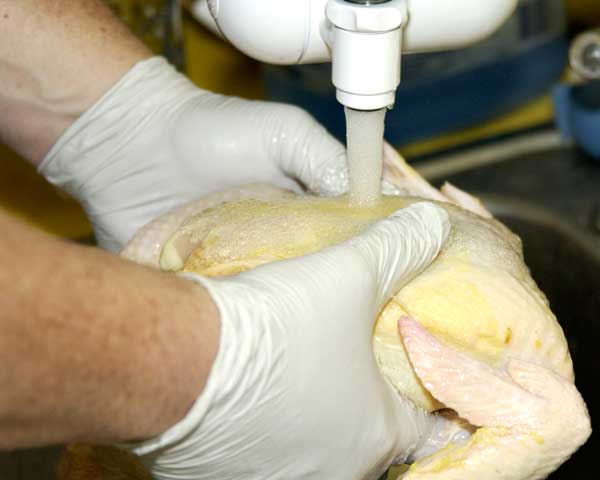In Sept. 2000, I called Procter & Gamble to substantiate claims their consumer-oriented FIT Fruit and Vegetable Wash removed 99.9 per cent more residue and dirt than water alone.
The PR-thingies hooked me up with some scientists at P&G in Cincinnati, who verbally told me that sample cucumbers, tomatoes and the like were grown on the same farm in California, sprayed with chemicals that would be used in .jpg) conventional production, and then harvested immediately and washed with FIT or water. The FIT removed 99.9 per cent more, or so the company claimed.
conventional production, and then harvested immediately and washed with FIT or water. The FIT removed 99.9 per cent more, or so the company claimed.
One problem. Many of the chemicals used had harvest?after dates, such as the one tomato chemical that must be applied at least 20 days before harvest. Residue data on produce in North American stores reveals extremely low levels, in the parts per million or billion. So that 99.9 per cent reduction was buying consumers an extra couple of zeros in the residue quantity, all well below health limits.
I also asked why the results hadn’t been published in a peer-reviewed journal, and the P&G types said it was an important advance that had to be made available to consumers as soon as possible, without the delays and messiness of peer-review.
Maybe Chiquita Brands, the owners of Fresh Express and also based in Cincinnati, are using the same PR flunkies as P&G because the public relations around the new produce rinse – FreshRinse – is strikingly familiar and equally lame as FIT in 2000.
For the most part, pathogens and chemicals in fresh produce need to be controlled on the farm, and in transportation and distribution.
The new rinse, for use in the packing shed and which the company says removes microorganisms from leafy greens more effectively than conventional chlorine sanitizers, was unveiled yesterday at a news conference at the Produce Marketing Association Fresh Summit to gushing reviews.
Fernando Aguirre, Chiquita’s chairman and chief executive officer, said,
"Based on our extensive research, we are proud to introduce the biggest invention since the creation of prepackaged salads. … Compare FreshRinse technology to current wash standards. Chlorine is the abacus and FreshRinse is the iPad. An abacus is what people use with the beads, a great thing at the time, just like chlorine rinse was. We believe FreshRinse sets a new standard in food safety.”
Also jumping aboard the metaphor train, Mike Burness, vice president of global quality and food safety said,
“As a matter of magnitude, that’s the equivalent of chlorine walking a mile and FreshRinse making two round trips to the moon. If chlorine walked one mile, FreshRinse would have walked a marathon. We have seen a significant reduction of potential foodborne organisms that cause disease.”
Scientific advisors who gave more qualified endorsements included project advisor Dr. Michael Osterholm, a professor in the School of Public Health at the University of Minnesota, Dr. David Acheson, managing director of food and import safety for Leavitt Partners and the former the Food and Drug .jpg) Administration associate commissioner for food protection and chief medical officer, and Dr. Robert Buchanan, director and professor, University of Maryland Center for Food Safety & Security Systems.
Administration associate commissioner for food protection and chief medical officer, and Dr. Robert Buchanan, director and professor, University of Maryland Center for Food Safety & Security Systems.
Did any of you esteemed science types say to Fresh Express, we should publish these results in a peer-reviewed journal first, because that’s the way this credibility thing works?
I told Ilan Brat of the Wall Street Journal yesterday that I couldn’t judge whether the new wash worked better or not without publication in a peer-reviewed journal.
Fresh Express had three recalls of its bagged salads this year, and was the source of a Salmonella typhirmirium outbreak that sickened eight people in May, but decided it wasn’t worth telling anyone about it.
Metaphor-man Burness, told the Journal the company chose to market the product before submitting supporting research for publication in peer-reviewed journals because "anything that advances food safety, we believe we need to leverage that for our consumers."
Sounds familiar.
He added that the company plans to submit its research to the Journal of Food Protection by the end of the year.
Dude, I’ve got a bunch of graduate students who say they have papers they are going to prepare for the Journal of Food Protection. I have about a dozen in my head too. Except that doesn’t count for shit.
If the company had instead spent the time it used coming up with terrible risk communication metaphors preparing the results for publication, they would at least have a paper submitted. Until then, I’m thinking cold fusion.
"All this data is nice—why isn’t it published in a peer-reviewed journal?" Powell said.
Still, he added, "if it does what it says it can do, that would be important, because it would be an additional tool to lower the risk" that eating salad greens could cause outbreaks of disease.
Fresh Express, you’re an industry leader and this year’s winner of the International Association for Food Protection’s Black Pearl award for food safety leadership. But I don’t get this. I’m all for marketing food safety, but with a strong caveat: be able to back it up.
A table of leafy green foodborne illness outbreaks is available at:
http://bites.ksu.edu/Outbreaks%20related%20to%20leafy%20greens%201993-2010
.jpg) the produce industry is in food safety together. ?
the produce industry is in food safety together. ?
.jpg) conventional production, and then harvested immediately and washed with FIT or water. The FIT removed 99.9 per cent more, or so the company claimed.
conventional production, and then harvested immediately and washed with FIT or water. The FIT removed 99.9 per cent more, or so the company claimed. The Telegraph reports
The Telegraph reports.jpg) manual labor and love.
manual labor and love..jpg) A barfblog reader nudged me yesterday regarding the Consumer Reports oh-my-god-there’s-bacteria-in-salad story to say,
A barfblog reader nudged me yesterday regarding the Consumer Reports oh-my-god-there’s-bacteria-in-salad story to say, But then, garbage should also be crushed, quickly, factually, and mercilessly, so it doesn’t get repeated forever.
But then, garbage should also be crushed, quickly, factually, and mercilessly, so it doesn’t get repeated forever. “Purchasing packaged salads or whole heads is a matter of personal choice. We do both in my family. I always wash loose leaf lettuces to remove any adhering soil. I never wash packaged salads. I do not support or believe that re-washing packaged salads should be a recommendation for the home consumer. A large and diverse panel of experts published a comprehensive article in 2007 detailing the scientific evidence for the lack of benefit and the greater risk of cross-contamination in the home.”
“Purchasing packaged salads or whole heads is a matter of personal choice. We do both in my family. I always wash loose leaf lettuces to remove any adhering soil. I never wash packaged salads. I do not support or believe that re-washing packaged salads should be a recommendation for the home consumer. A large and diverse panel of experts published a comprehensive article in 2007 detailing the scientific evidence for the lack of benefit and the greater risk of cross-contamination in the home.”.jpg) The issue is complicated, but for Consumers Union to come out with a soundbite about washing greens is great PR and lousy public policy. For journalists not to check is becoming standard for an industry in decline. For the producers of bagged leafy greens, this is an opportunity to tout your food safety efforts and market them at retail so consumers can choose.
The issue is complicated, but for Consumers Union to come out with a soundbite about washing greens is great PR and lousy public policy. For journalists not to check is becoming standard for an industry in decline. For the producers of bagged leafy greens, this is an opportunity to tout your food safety efforts and market them at retail so consumers can choose.